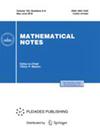论随机马尔可夫散步局部更新定理的收敛率
IF 0.6
4区 数学
Q3 MATHEMATICS
引用次数: 0
摘要
Abstract 假设随机变量序列 \(\{X_n\}_{n\ge 0}\)是一个具有有限状态集的同构不可还原马尔可夫链。让 \(\xi_n\), \(n\in\mathbb{N}\), 都是定义在链转换上的随机变量。 更新函数 $$u_k:=\sum_{n=0}^{+\infty}\其中,引入了\(S_0:=0\)和\(S_n:=\xi_1+\dots +\xi_n\), \(nin\mathbb{N})。结果表明,该函数以指数速度收敛到其极限,并给出了指数的明确描述。本文章由计算机程序翻译,如有差异,请以英文原文为准。
On the Convergence Rate in a Local Renewal Theorem for a Random Markov Walk
Abstract
Suppose that a sequence \(\{X_n\}_{n\ge 0}\) of random variables is a homogeneous irreducible Markov chain with finite set of states. Let \(\xi_n\), \(n\in\mathbb{N}\), be random variables defined on the chain transitions.
The renewal function
$$u_k:=\sum_{n=0}^{+\infty} \mathsf P(S_n=k), \qquad k\in\mathbb{N},$$where \(S_0:=0\) and \(S_n:=\xi_1+\dots + \xi_n\), \(n\in\mathbb{N}\), is introduced. It is shown that this function converges to its limit at an exponential rate, and an explicit description of the exponent is given.
求助全文
通过发布文献求助,成功后即可免费获取论文全文。
去求助
来源期刊

Mathematical Notes
数学-数学
CiteScore
0.90
自引率
16.70%
发文量
179
审稿时长
24 months
期刊介绍:
Mathematical Notes is a journal that publishes research papers and review articles in modern algebra, geometry and number theory, functional analysis, logic, set and measure theory, topology, probability and stochastics, differential and noncommutative geometry, operator and group theory, asymptotic and approximation methods, mathematical finance, linear and nonlinear equations, ergodic and spectral theory, operator algebras, and other related theoretical fields. It also presents rigorous results in mathematical physics.
 求助内容:
求助内容: 应助结果提醒方式:
应助结果提醒方式:


